On the evening of October 17th the BBC was quick to tell its worldwide audiences about an “Israeli air strike on [a] hospital in Gaza”:

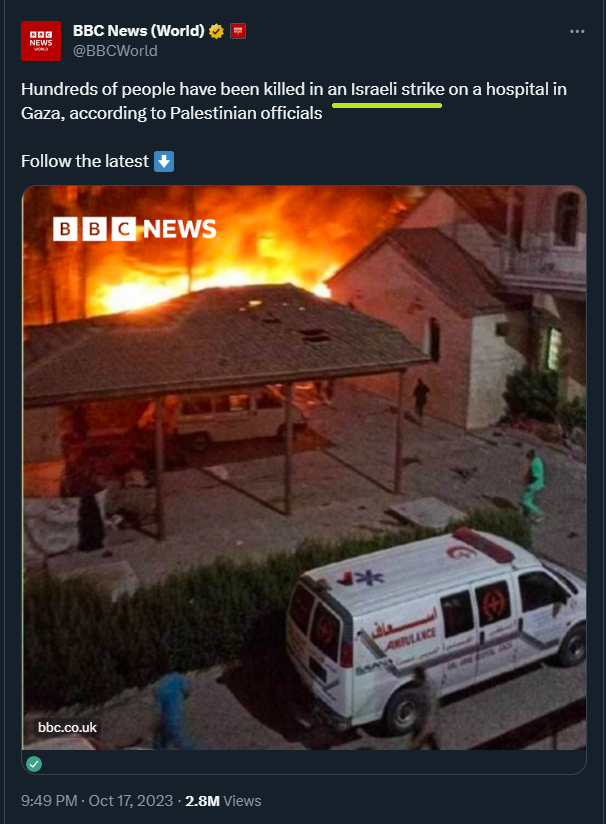
That news from the trusted BBC was of course picked up and further disseminated by others.
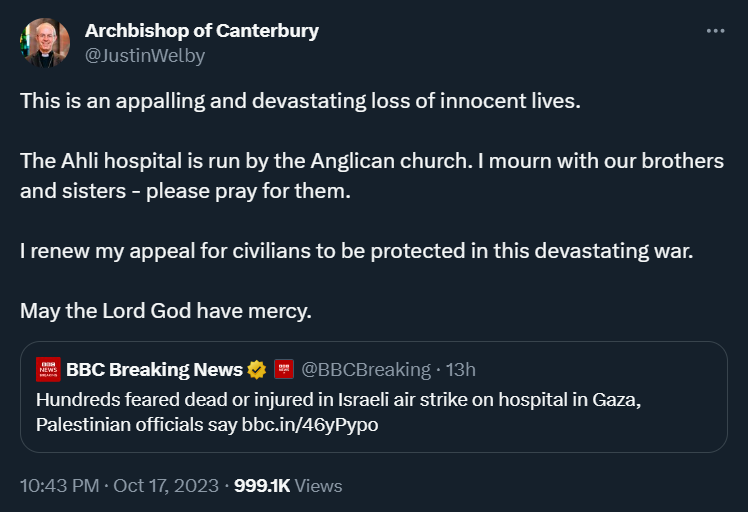
Shortly after news of the incident broke, the IDF announced that it would investigate. In the meantime, the BBC’s Jon Donnison – who, despite his record, had once again been ‘parachuted’ into the region several days previously and was reporting from Jerusalem – told BBC television audiences that: [emphasis in the original]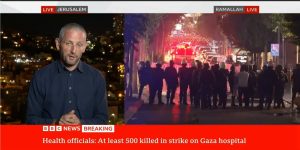
Donnison: “The Israeli military […] have said that they are investigating. But, you know, it is hard to see what else this could be, really – given the size of the explosion – other than an Israeli airstrike or several airstrikes…ah…because, you know, when we’ve seen rockets being fired out of Gaza, we never see explosions of this scale. We might see half a dozen – maybe a few more – people being killed in such rocket attacks but we’ve never seen anything on the scale of the sort of explosion on the video I was watching…”
Some two hours later the IDF announced that investigations showed that the cause of the explosion at Al Ahli hospital was a malfunctioning rocket launched by the Palestinian Islamic Jihad. Several hours later the IDF spokesman gave a full briefing on the matter.
“At 6:59PM a barrage of around 10 rockets was fired by Islamic Jihad from a nearby cemetery.
It was at the time, 6:59PM — when there were reports of an explosion at the hospital in Gaza City.
According to our intelligence, Hamas checked the reports, understood it was an Islamic Jihad rocket that had misfired — and decided to launch a global media campaign to hide what really happened. They went as far as inflating the number of casualties.
They understood, with absolute certainty, that it was a rocket misfired by Islamic Jihad — that damaged the hospital.
Analysis of our aerial footage confirms that there was no direct hit of the hospital itself. The only location damaged is outside the hospital in the parking lot where we can see signs of burning, no cratering and no structural damage to nearby buildings. As opposed to the damage caused by any aerial munition which would have been of a different nature: We would have seen craters and structural damage to buildings, both of which haven’t been identified in this incident.”
The BBC News website’s live pages (here and here) – along with other BBC departments – continued however to promote the notion of “claims and counter claims” and ‘he said-she said’ accounts of the story.
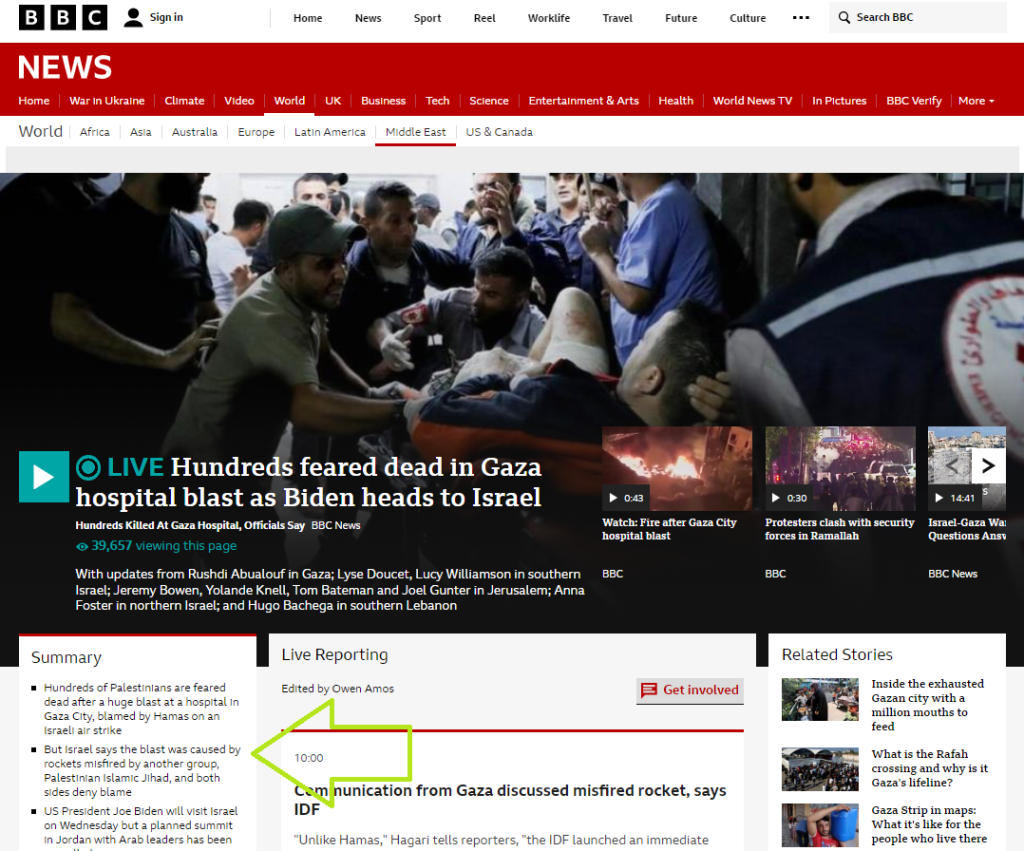
The BBC also continued to amplify claims it had not independently verified from sources it failed to identify as Hamas.
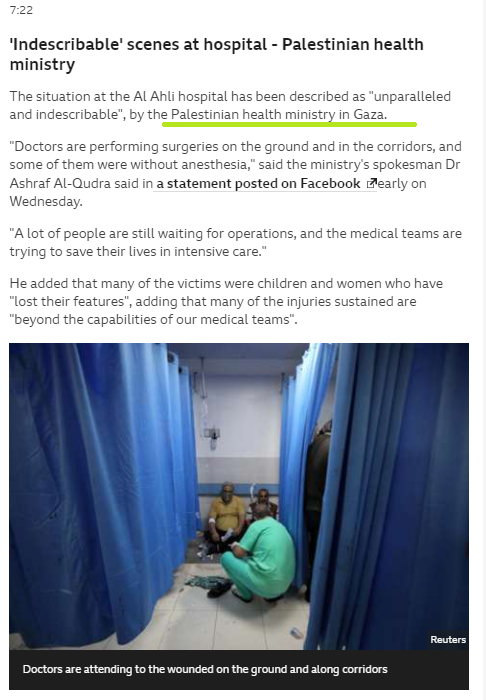
Even after the IDF had made the results of its investigation public, the BBC News website continued to give equal weight to the unverified claims of a terrorist organisation and the results of the investigation conducted by the IDF.
Early on the morning of October 18th – at about 4 am Israeli time – a report by David Gritten which was originally headlined “Israel Gaza: Hospital blast kills hundreds – health officials” and later retitled “Hospital blast in Gaza City kills hundreds – health officials” appeared on the BBC News website’s ‘Middle East’ page. Once again that report quotes “health officials” without clarifying that they are part of the terrorist organisation which deliberately started this war.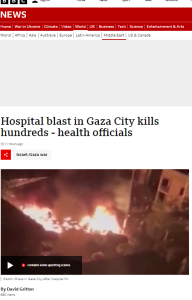
“Hundreds of people have been killed by an explosion at a crowded hospital in Gaza City, health officials say.
One doctor condemned what he called “a massacre” at Al-Ahli Arab Hospital, while another spoke of a scene of total devastation.
Palestinian officials say the blast was caused by an Israeli air strike.
But the Israeli military say it was the result of a failed rocket launch by Palestinian Islamic Jihad – an accusation the militant group rejected.”
Readers are told that:
“Israeli warplanes and artillery have been bombarding Gaza in response to an unprecedented attack on Israel on 7 October by the main Palestinian militant group, Hamas, which killed 1,300 people.
More than 3,000 people have been reported killed by strikes on Gaza.”
However, no mention is made of the thousands of rockets launched by terrorists in the Gaza Strip during the same period of time.
Gritten goes on to amplify specious claims from assorted parties, which the BBC has obviously not independently verified.
“Zaher Kuhail, a British-Palestinian civil engineering consultant and university professor who was nearby at the time, told the BBC that what he had witnessed was “beyond imagination”.
“I [saw] two rockets coming from an F-16 or an F-35 [fighter jet], shelling these people and killing them ruthlessly, without any mercy,” he said.”
The sole mention of the obviously relevant issue of shortfall missiles comes in Gritten’s account of the statement from the IDF spokesman.
“He said 450 of the thousands of rockets fired indiscriminately towards Israel since the beginning of the war had fallen within Gaza, endangering civilians.”
Sadly for BBC audiences – and the corporation’s funding public – we should not be surprised by the alacrity with which BBC journalists allowed themselves and their brand to be exploited by the Hamas terrorist organisation for anti-Israel propaganda purposes. Let’s recall just a few of the many similar cases seen in the past:
November 2012: the Omar Masharawi story – in which the above Jon Donnison was assigned to do ‘damage control’ after it emerged that the infant son of a BBC employee in the Gaza Strip had been killed by a shortfall Palestinian rocket rather than an Israeli airstrike as claimed by the BBC.
Another BBC reporter who recklessly promoted that story at the time – Paul Adams – is also contributing to coverage of the current conflict.
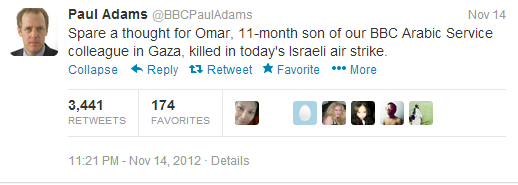

Notably, the BBC’s original filmed report on that story is still available online, with a footnote having been added four months later:
“UPDATE (12 March 2013): A draft report by the UN Office of the High Commissioner for Human Rights said that Omar Mashhrawi, the 11-month-old son of a BBC journalist in Gaza, may have been killed by a Palestinian rocket, not an Israeli one.” [emphasis added]
The same footnote appears on Donnison’s original report on the incident, which is also still available online.
As we have noted in the past, that irresponsible reporting was used by third parties to promote anti-Israel hate:
After effects: BBC accuracy failure used to promote hate
After effects 2 : BBC accuracy failure again used to promote hatred
After effects 3: BBC accuracy failure still being used against Israel
July 2014: Shati refugee camp/Shifa hospital explosion.
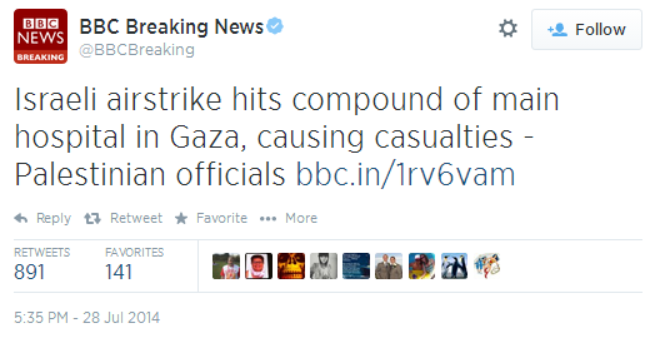
Despite an official investigation into that incident having been carried out, a BBC report from the time which is still available online continues to promote “the Palestinian view” and “the Israeli view” of that incident rather than telling readers what in fact happened. Footnotes were not added to the other four BBC reports relating to that incident which also remain online.
May 2021: Beit Hanoun incident. Among the BBC’s coverage of that incident was a report by another journalist now in Israel to cover the current conflict – Jeremy Bowen – who promoted the claim that children had been killed in an Israeli airstrike despite an investigation having already shown that their deaths were caused by a shortfall missile.
May 2023: Operation Shield and Arrow. The BBC repeatedly promoted Palestinian Islamic Jihad denials concerning shortfall missiles.
As we see, the BBC’s record of real time reporting on deaths caused by Palestinians shortfall missiles – and subsequent necessary corrections and clarifications – has left much to be desired for at least a decade. Together with its chronic failure to be adequately cautious about propaganda promoted by terrorist organisations and other interested parties, it is hardly surprising that BBC coverage of this latest incident at Al Ahli hospital failed to provide BBC audiences with the accurate and impartial information needed to understand the story.

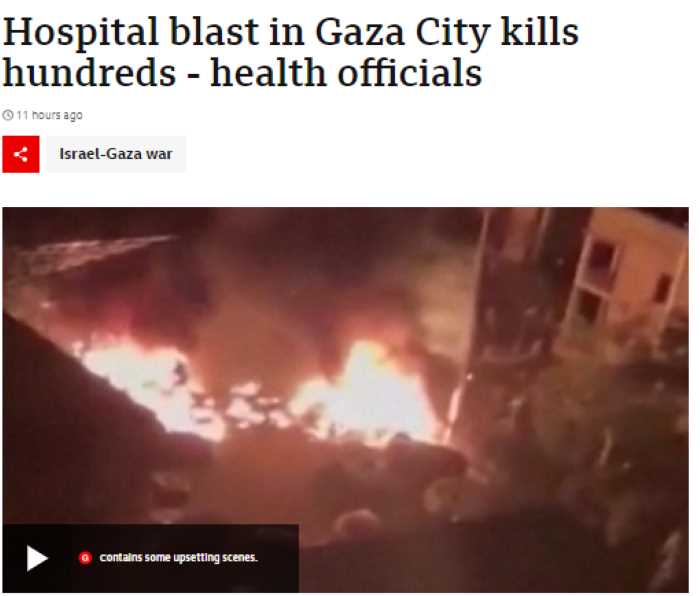

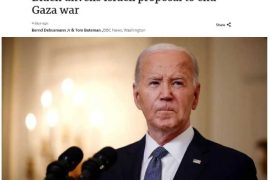

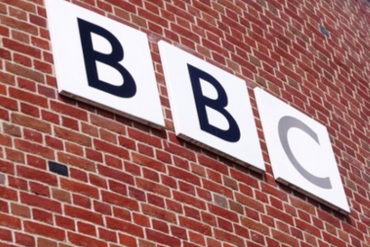
In light of these biased and inaccurate BBC reports, the increase in anti-semitic expression in Britain should come as no surprise.
Once the report of an incident is out, later attempts to correct or modify the earlier expressions are almost totally useless.
As the BBC’s main international reporter, Lyse Doucet, herself recently said; once a report is published, it is the the impression that it leaves with the reader/listener which is more effective than the truth or otherwise of the facts lying behind the report.
The BBC’s editorial teams and reporters needs to be held to greater account than the level currently being required of them.
After the President of Israel lambasted the BBC for its disgraceful reporting, now is the time for its office in Jerusalem to be closed down and the so-called journalists thrown out of the nation state.
BBC journalists = racist bigoted Jew haters. #defundthebbc
They are totally responsible for the lies and deception about Israel that are whipping up extremist Muslims worldwide into an abusive frenzy of violence towards Jews and Israel . It is time to sack the lot of them.